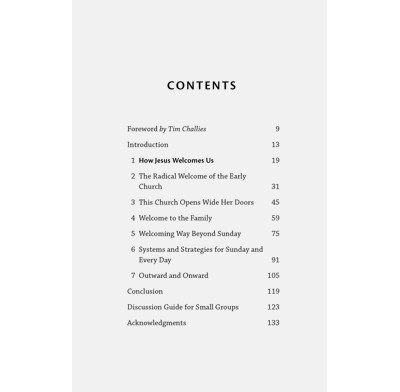Walking into church can be intimidating, whether for the first time or after a period of absence, whether you are a non-believer or a believer. Wouldn’t it be wonderful if your church was a place where everyone received a warm welcome? A place where newcomers can quickly feel at home and where non-believers receive the welcome of God’s people alongside the welcome of Jesus?
This warm, practical book by Jen Oshman explores what the Bible says to help readers discover how to make space for others, however different they are to them, in their church and in their lives. She also gives practical advice, drawing on good practice from churches around the world in a range of situations. In a world of division, individualism, and isolation, readers will see that their church can witness to Christ by being a place of welcome, community, and connection.
Whether you’re a pastor looking to encourage your congregation to welcome others or a church member wanting to see unbelievers come to faith and help everyone feel part of the family, this resource is for you.
There are discussion questions at the end of every chapter with action steps, making it ideal to read as a small group or even a whole church. Accompanying free downloads are available that can be used for small groups. There are downloadable worksheets, a PDF version of the book's discussion guide, introductory videos for each chapter and more.
This book is part of the Love Your Church series, a collection of thoughtful and practical books that will inspire every church member with a biblical vision of what it means to be a local community of God’s family. Church members can explore together what it means to belong, to welcome, to gather, to care, to serve and to honor one another, and to witness and send people out to spread the gospel.
J.T. English
Lead Pastor, Storyline Fellowship, Arvada, Colorado, and Author of Deep Discipleship
The most welcoming place on the planet should be the church, and the most welcoming people on the planet should be Christians. Why? So that sinners can hear the good news of the gospel of Jesus Christ. In Welcome, we are invited to fling open the doors of the church and open the doors of our lives so that all people will have the chance to hear about who Jesus is and what he has accomplished for a lost and dying world.
Gavin Ortlund
Founder, Truth Unites; Author, Finding the Right Hills to Die On
The gospel should create a culture of welcome (Romans 15:7) so that the local church is, as Jen Oshman beautifully puts it, ‘a porch light in a dark night.’ This is all the more important in a time of deep loneliness and fragmentation. This wonderful book will help both church leaders and regular members build a culture in their churches that reflects the welcome of the gospel. It is filled with practical ideas, biblical and historical wisdom, and counsel that touches the heart. Highly recommended!
“Encouraging, but missed the mark a bit for me.”
Pg 41 encouraged my type A schedule and to-do list loving heart: “Do I make space in my life, and in my schedule, for those whose lives are messy or awkward or just very different from my own?”
She reminds us of the truth at the heart of the gospel - that we are, by nature, enemies of God. And that only though the shed blood of Jesus are we welcomed into God’s family. This should spur us into welcoming others in the same way.
Chapters 6 and 7 were not my favorite. She did point out that she was not advocating for making “visiting a church so convenient and attractive that we demolish the gospel” which I appreciated because many of the surrounding pages made it sound that way. Outreach is important, but it is by no means the primary focus or purpose of a church. My personal opinion is that far too many churches focus on bringing in people and wha results is the gospel is watered down or replaced with emotional responses to culture. Expositing the word is replaced with feel good, topical preaching. Of course church should be welcoming, but we should raise up those who join us, educating and encouraging them to the truth of the gospel instead of focusing on not offending anyone. She also says “An inward focus harms a church, while an outward focused brings life.” Followed with “Churches that maintain an outward focus are the healthiest.” These seem like arbitrary statements. Define healthiest? Large numbers don’t equate to healthy, gospel-centered churches. For both examples, the focus is wrong. The ultimate focus of any healthy church is God. I do think some of these statements and ideas fleshed out in conversation with the author may show that we align more than this book has led me to believe.
In her conclusion she does clarify that God alone provides the growth and encourages us to “give our lives over to the task of planting seeds and watering them” while also reminding us of John 6:44 and that no one can come to Jesus unless that Father draws him.
“The Importance of being a welcoming church”
I thoroughly enjoyed reading Welcome by Jen Oshman. How we welcome visitors, people perhaps apprehensive about visiting a church for the first time or even how we welcome people who have been coming to church for many years; these are aspects that many churches overlook or give very little consideration to.
This book firstly gives a biblical perspective to these issues, and most importantly gives encouragement and practical ideas, based on years of experience by the author.
I heartily recommend this book for church leaders, elders, deacons, indeed to all church members. I’m sure they will find it challenging and encouraging.
“The Gift of Loving Your Church”
The third book in the series by Jen Oshman is titled Welcome: Loving Your Church by Make Space For Everyone (2023). Many churches today are seen as unwelcoming at best, and hostile to outsiders at worst. Neither of these should be the case. The local church should be the most welcoming place on earth. That is not to say that in order to be a welcoming church, it has to compromise the biblical gospel. The exact opposite is true. It is only because the biblical gospel is the only way to salvation that the church should welcome everyone with open arms so that they come and hear the good news of Jesus.
Being a welcoming church is not something that comes easy, but must be worked at with eagerness. It is easy to congregate in a “holy huddle” and not be open to folks that don’t look and sound like us. For this reason, local churches must have strategies to insure that visitors feel welcome when they visit. This will look different based on context, but local churches should be intentional about teaching its members the importance of being welcoming. Over time, this effort will go a long way in not only reaching a community with the biblical gospel, but can help make the Christian faith more appealing to those who may have once been skeptical.
The Love Your Church series is an excellent set of resources for church leaders and lay people alike. Each volume exhorts local churches to be what the church is called to be by Jesus. The church is an institution established by the Lord to propagate the gospel to the ends of the earth. Jesus promised that the gates of hell would not prevail against it (Matthew 16:18). This promise should give the church confidence in its mission, but also serve as a warning. It is only when we are standing on the biblical gospel, that we stand firm. For this reason, the church should be a place to gather for worship, find true belonging, and welcome others to come and find rest.
“convicting”
This is the third new book in the Love Your Church series by The Good Book Company. Oshman discusses the need for the Church body to confirm all are welcome to both the Church and to Christ.
The book is structured with seven chapters, each addressing a facet of what it means to welcome those into the church body. Each chapter, once again, concludes with action steps and once again, my favorite part of the book. When you are a task oriented person, you thrive off a check list of actionable bullet points. These have a wide range of applicability but all focus on how you as an individual or church body can welcome all people into the life of Christ and his body.
I appreciated Oshman discussing historical events along with biblical events that display how the Church body welcomed any and all people. She provides a plethora of examples of historical and current Churches who have and are practicing the concept of "welcome". These provide such great insight into how we can grow the "welcome" within our own churches.
As like the other books in the series, this one includes a small group discussion guide to allow for group study.
I received a copy of this book from The Good Book Company in exchange for an honest review.




